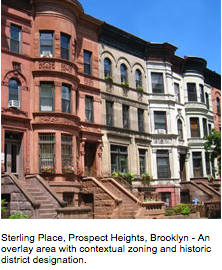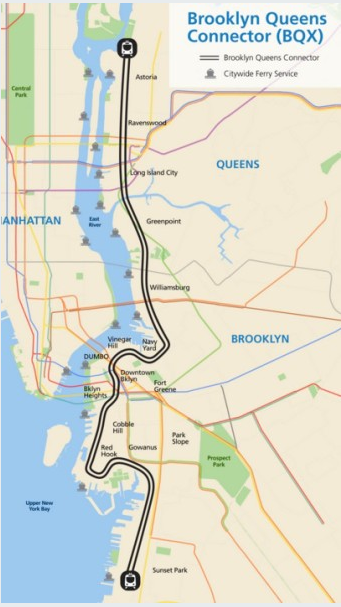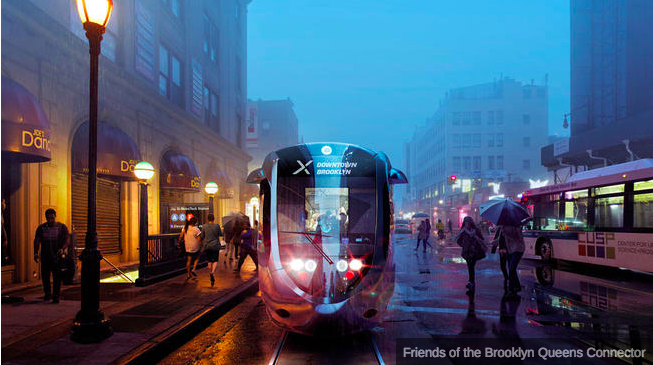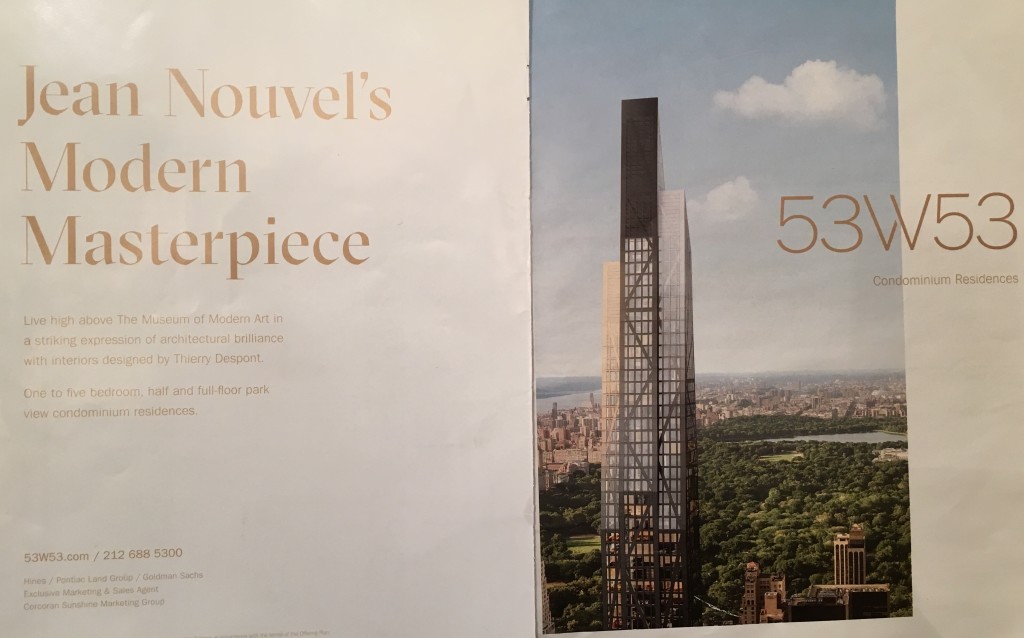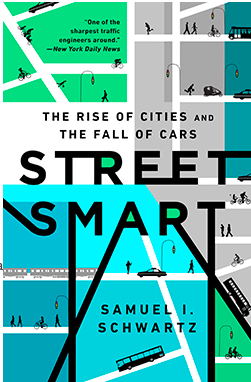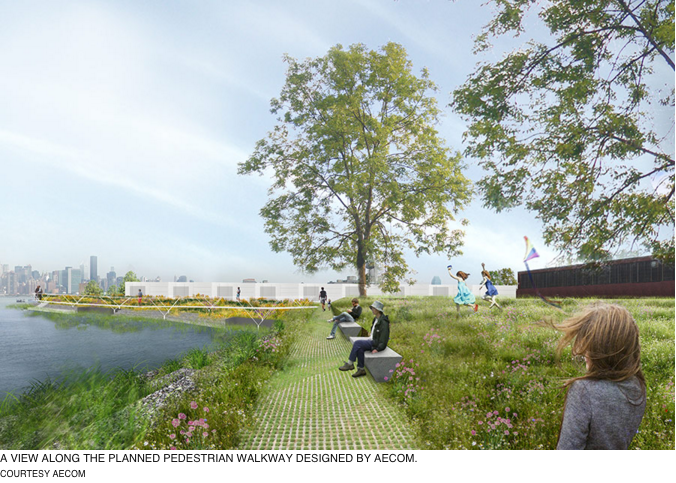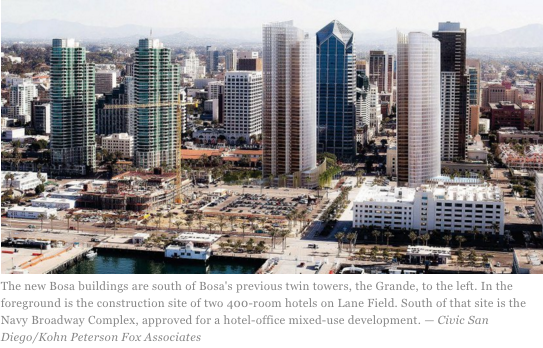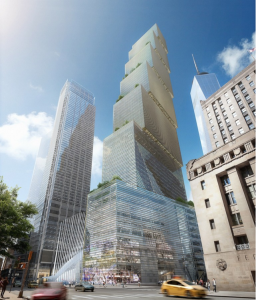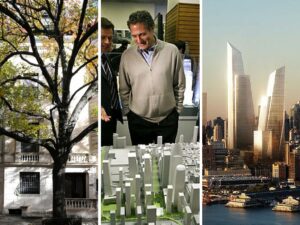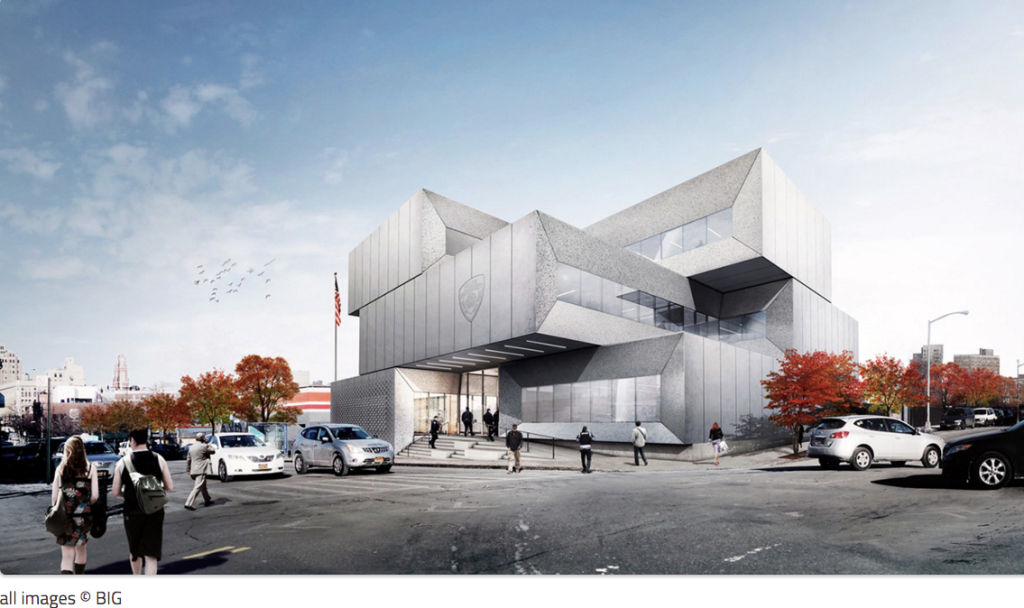Save the Dates to Save Your Neighborhood! 2/9/16 & 2/10/16
The City Council will be holding two meetings next week to hear public testimony regarding Zoning for Quality and Affordability (ZQA) and Mandatory Inclusionary Housing (MIH). The meetings are scheduled for February 9th, at 9:30am and February 10th, at 9:30am. Located in the Council Chambers at City Hall. MIH will be the main topic on the 9th, but testimony will be heard regarding ZQA – and vice versa for the 10th.
Please note that each person wanting to give testimony is limited to two minutes. If you’d like to have something concise to say, tell the Council to vote it down or send a letter here. If you feel like compromise is in order, Landmark Conservancy has created some concise bullet points
Landmarks Conservancy ZQA compromise recommendations include –
- Eliminate contextual zones and historic districts from the ZQA proposal so as to protect their existing integrity.
- Don’t allow for buildings to encroach on in rear yards to protect light, air and open space.
- Retain the existing Sliver Law regulations, which restrict tall narrow buildings on side streets.
- Bonuses for senior housing should be tied to permanent affordability—not the bill’s 30-year limit— or they should be eliminated.
Landmarks Conservancy MIH compromise recommendations include:
- Affordability should be measured by incomes for the borough, neighborhood or census blocks.
- MIH uses the New York Metropolitan Area average, which is too high.
- Existing affordable housing should be preserved or replaced in kind.
To read the full public testimony for Landmark Conservancy’s position, click here or cruise over to LANDMARK WEST!’s website here.
Love a New Streetcar, but WHERE?
Seriously, this has got to be one of the most shameful real estate plays the city is dumping on us. In his State of the City speech, Mayor de Blasio announced a new “Brooklyn Queens Connector” streetcar plan. The proposed train is a light rail system that runs along existing streets from the Brooklyn waterfront neighborhoods to the Queens waterfront neighborhoods. Alicia Glen got on TV and offered a lot of nonsensical spin, but utterly messed up the pitch and “confessed” she will pay for it by generating value (meaning property taxes) out of the currently undeveloped parcels along the entire waterfront. Hmmm. Who owns those parcels now, parcels soon to be very valuable? But there is a possible bogus bonus point: it would allow public housing residents in Red Hook to have a faster commute to the Brooklyn Navy Yard.
On one hand, who doesn’t love a streetcar? Brooklyn used to have the most extensive streetcar network anywhere until some politician decided to rip it out to favor cars. But before getting too excited, let’s think.
Would this proposal merely connect the wealthy, highly developed areas where the Durst real estate family (and others) have been investing and speculating? And why aren’t we proposing a streetcar system to connect the lower-density, outer borough, car-dependent neighborhoods of Queens and Brooklyn to the major subway stops, since that is where people would still obliged to commute via car? So many questions to ask. If we can build new public transit along the currently un-condo filled waterfront, so to facilitate condo construction there, why not build instead a light-rail system into the currently car-dependent neighborhoods? What’s really going on? Is Big Real Estate funding the “Friends of the Brooklyn Queens Connector” in a real estate play to overdevelop the waterfront into luxury towers? Not sure this idea passes the sniff test of being clean of Big Real Estate interests. Given the way developers run the show, we have reason to be more than just a bit suspicious. Just because streetcars are sexy to many urbanists, including this writer, they are no substitute for real planning about where density should go, like the car-dependent outer reaches of our city. To read more about the proposed project, click here.
Despicable Real Estate Ad of the Week
Masterpiece? Oh puh-leeze! Masterpiece of highway robbery of the public realm. Architecture? Zilch.
Book Talk: February 8, 2016
AIA New York – Center for Architecture is hosting a book talk with author, architect and all around transit-wonk, Samuel Schwartz.
His new book, “Street Smart explores recent trends that show that Americans, particularly Millennials, have been driving markedly less than they used to. Author Sam Schwartz describes how this change in car usage ultimately benefits cities, making them healthier and increasing property values, in a book that has been praised for its timeliness and insight.”
The talk will be held at the Center for Architecture (536 LaGuardia Place, NYC 10012) on February 8th from 6-8pm.
To read more about the talk, and to register for the event, click here.
Quote of the Week:
There was a small victory for Friends of Bushwick Inlet Park this past week. As you may recall, they have been advocating that the city keep its promise to build out this park (rendering shown below) on what is now several potential waterfront development sites. Their advocacy work has been in the face of relentless development pressure, particularly on a CitiStorage building that has been in play. At last advocates have gotten their community board to side with them, and De Blasio has made promises of the type: ” I won’t rezone this area for apartments.” Let’s hope so. Read the article in the Brooklyn papers here:
But it is the press releases of the Friendsof Bushwick Inlet Park that wins the quote of the week. Katherine Thompson said: “A great park will be such a boon to this neighborhood. For the people that have lived here for a long time and have done the fighting, it’s going to be a really big disappointment if they feel like this neighborhood has been taken away by rampant outsized development that has disregarded the fabric of our community.”
Architect’s Newspaper also covered the issue here with a focus on the design of the potential park. Looks great doesn’t it? It may be a bit of fantasy however. Notice those black and white looming buildings in the distance, looking all hopefully human-scaled. They are the mixed use development that is supposed to pay for the park….all 600,000 square feet of development rights conveniently tucked away in the corners of what is meant to be bucolic paradise…. And where would the new streetcar line go?
Picket Protests at the State of the City
Mayor de Blasio gave his annual State of the City address and was greeted with protestors condemning his zoning proposals. Largely concerned with what is considered “affordable”, many tenant and housing groups turned out to protest the administrations’ new zoning regulations and MIH plans.
To read more about the picket, go here to see AM New York’s coverage.
The Human-scale Fight is Happening Everywhere
Just so you know we are not alone. Project for Public Spaces writes in that San Diego is also reeling from bombardment with unnecessary monolithic high-rise towers. Neighborhood residents are being forced out and developers are on an unfettered building spree. Bosa Development has just announced another 45-story tower to be a companion tower to their 41-story Pacific Gate tower. And these two towers are just down the street from their other 2 twin towers, the Grande.
To read more about the developments in San Diego, click here.
To read more about The Project for Public Spaces, and the work they’re doing to preserve neighborhood fabric in New York and elsewhere, click here.
Don’t Miss This Brilliant Essay: “The Design for 2 WTC and the Dangers of Building Neighborhoods in the Sky”
Joshua Decter, a writer, art historian, and faculty member at Cooper Union recently saved me a huge chunk of work and did the wider world a public service by writing a profoundly brilliant dissection of the infuriatingly awful design for 2 World Trade Center by Mr. Bombast himself, Bjarke Ingels. It was published on “The Hyperallergic.” Some good quotes:
On Ingels’ vision of the tower as a working neighborhood:
“Employees will not merely labor in alienating workspaces, but will belong to a neighborhood of workers in the sky: the “lifestyle community” of corporate employment. The workplace as privileged neighborhood? Reading the Ingels design on metaphorical terms, to me it symbolizes not the potential harmonization of older human-scaled structures with newer post–human scale megastructures in our cityscape, but rather their basic irreconcilability.”
“Who needs authentic neighborhoods when simulated neighborhoods can be generated as/within residential and office towers?”
On the problem of human-scale development:
“If you build vertical towers, this produces increased urban density down at street level, yet there seems to be little thought about how to deal with this density on an everyday, lived basis.”
“This is urban acupuncture taken to an absurd limit; these super-expensive needle supertowers may burst the city before the real estate bubble bursts.”
“Wouldn’t it be nice to see Ingels engage with a wide range of NYC residents in public dialogues about 2 WTC, instead of merely paying lip service to ideas of neighborhood and community by producing a ginormous hypermodernist corporate simulacrum that seems to usher in the end of any traditional conditions of human-scale density, neighborhood and community?”
On the future of New York:
“If there is delirium today, it is the delirium of excess capital, some of which has been generated by an overheated real estate market that threatens to transform the city into a vast gated community of luxury condos and rentals.”
“In terms of the ethics and politics of architecture and urban development, today’s progressive architect needs to rethink the top-down, fait accompli approach and find innovative ways to constructively reach out to the multiple populations (in addition to community boards) that comprise a city, as an integral part of the design process.”
“Maybe we’ve reached a tipping point, and now we need to tip back in the direction of an authentically diverse, equitable cosmopolitanism, and embrace the ethos of inhabiting a complex, shared urbanity: a just city that benefits the many, not only the few.”
To read the full article, click here.
Visual Game for Human-Scale City Fans: Who’s the NIMBY?
We’ve put together some photo collages for you of famous politicians, architects, and planners. They all advocate for hyper-density and super-towers. They want all of us, rich and poor alike, to live in towers. But where do they actually chose to live?
Dan Doctoroff, (middle) advocate of hyper-density (middle) and the Hudson Yards boondoggle (right) lived during his advocacy work in a human-scaled West Side townhouse, shown on the left.
——————————————————————————————————-
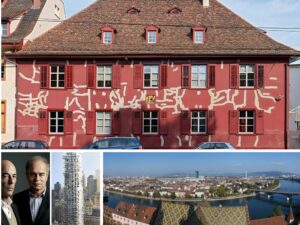
Architects DeMeuron and Herzog (bottom left) designed the neighborhood destroying tower at 56 Leonard in Tribeca (bottom middle), but work in this human-scaled house (top) in Basel, Switzerland, one of the most protected cities in Europe (bottom right).
—
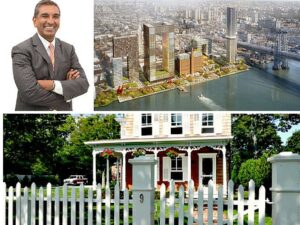
Vishaan Chakrabarti (upper left), ideologue of hyper-density (Domino Sugar, upper right) and author of “A Country of Cities” weekends and summers in the charming, human-scaled Long Island village of Bellport (typical house shown on bottom).
————————————————————————————————————
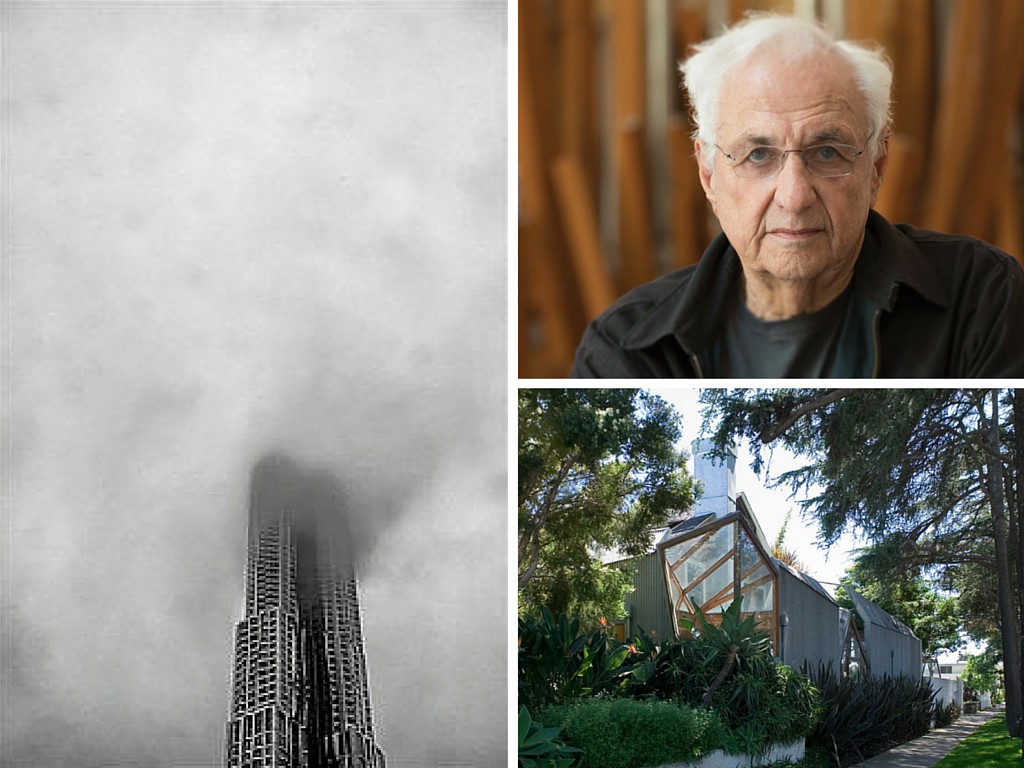
Architect Frank Gehry (upper right) of Gehry Building fame (left) lived for years in the human-scale suburban house in Santa Monica, CA.
—————————————————————————————————————————————
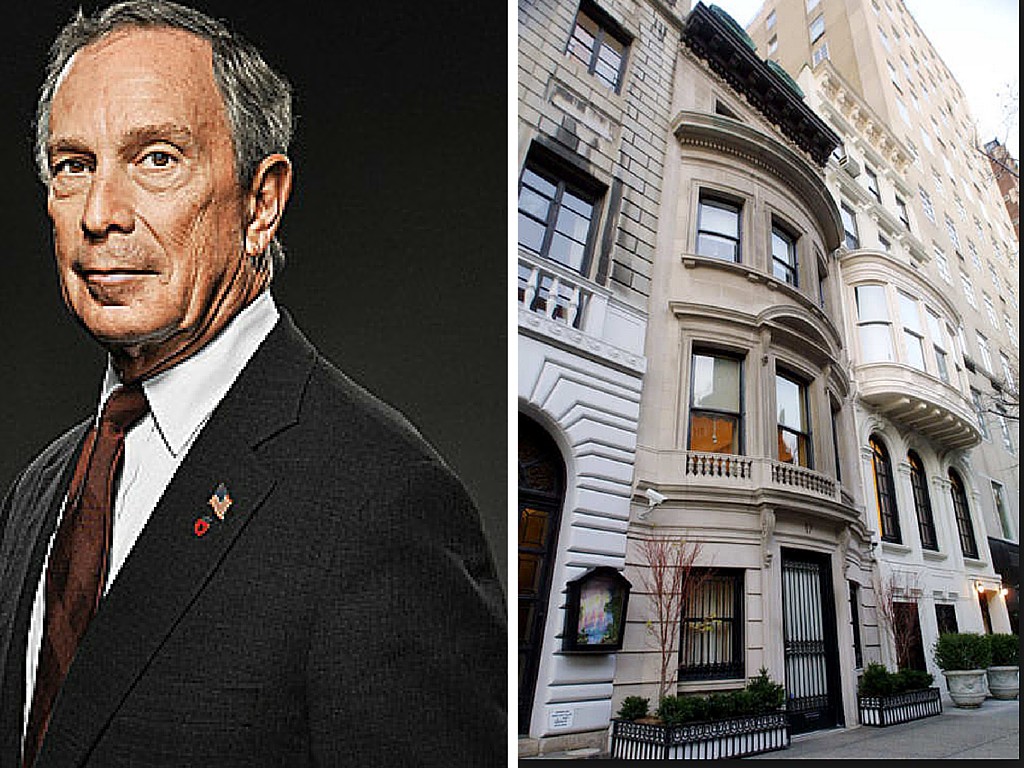
Ex-Mayor Bloomberg (left) launched the city into the world of hyper-density all while living in a lovely, human-scale landmarked townhouse on East 79th Street.
——————————————————————————————————————————————————–
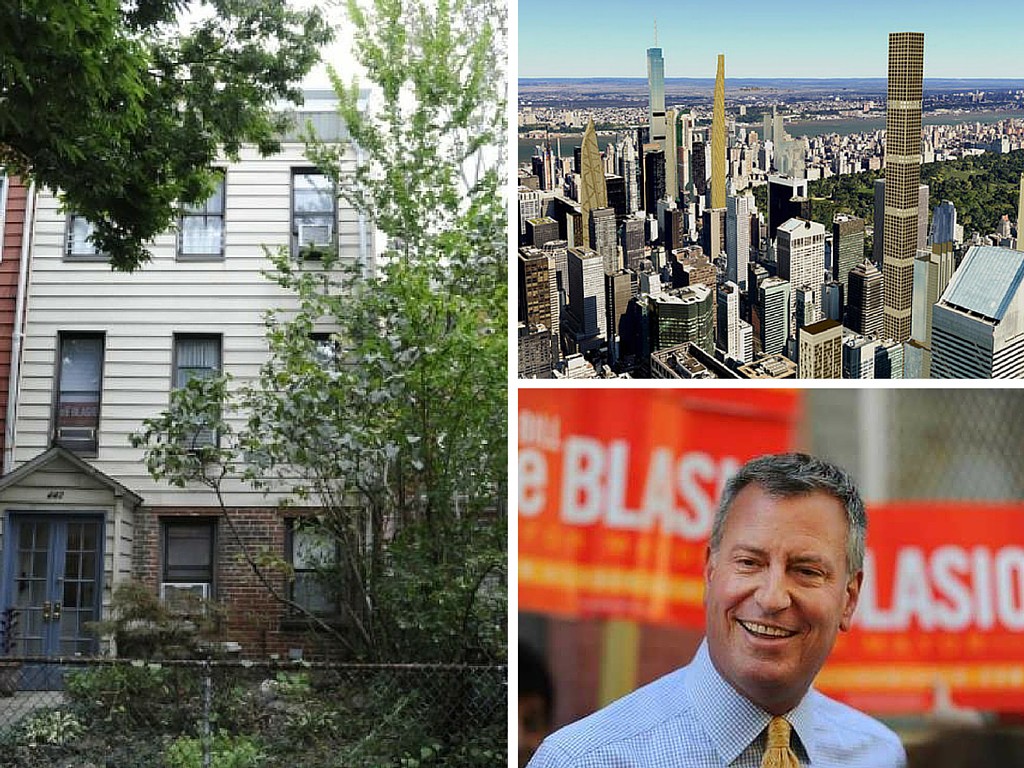
Mayor Bill De Blasio (lower right) is pushing us all into hyper-density, despite living in human-scaled Gracie Mansion and formerly living in human-scaled Park Slope (his Park Slope house pictured left).
——————————————————————————————————————————————————-
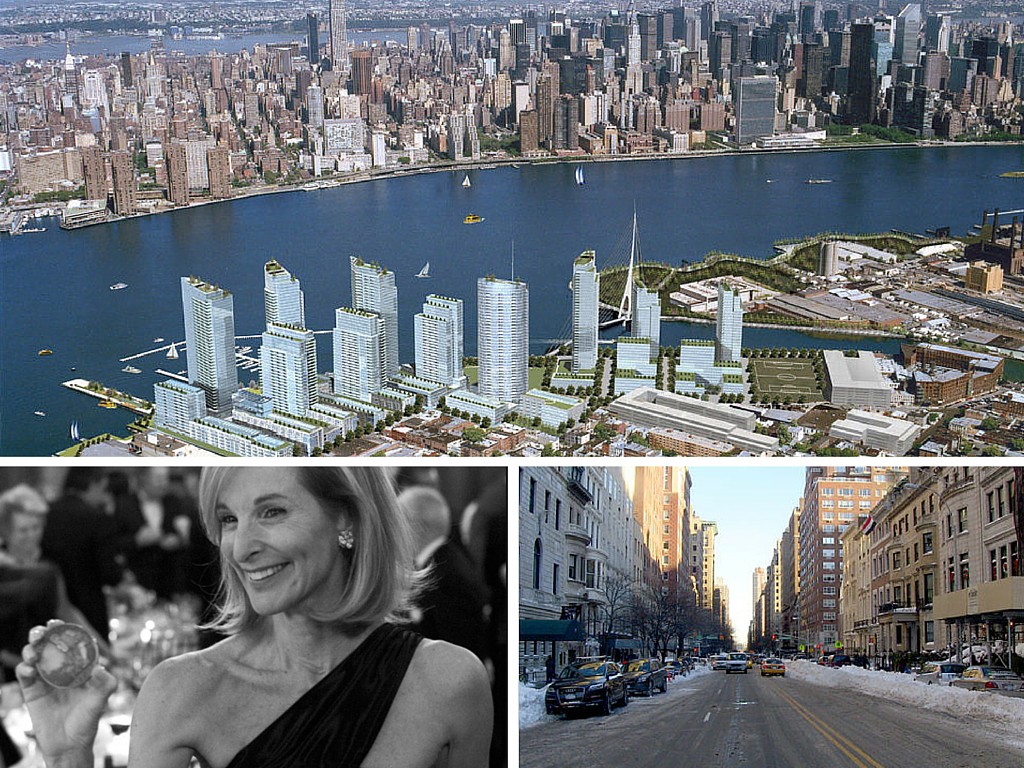
Socialite and former head of City Planning Amanda Burden (lower left) shoved through Bloomberg and Doctoroff’s hyper-density ideas ( shown above), all while sharing the block with Mayor Bloomberg on human-scaled, and landmarked, East 79th Street
Eyesore of the Week: The New Police Station Building Proposed for the Bronx
I don’t even need to talk about this again. But I will. It’s not only unbelievably ugly, anti-urban, an insult to the great history of public architecture in New York City, but think of the horrible messages it is sending to Bronx residents (Hey, don’t commit a crime, because then we’ll drag you into this particular hellhole of the apocalpyse and you might never find your way out…). It is architecture as punishment, all BEFORE you are found guilty. You get punished just walking by. And who is paying for this boondoggle anyway? I can’t even fathom what was going on in the minds of the laughably named firm of BIG Architects when they did this. Compare it to the police station in my precinct shown below. Now there is some human-scale architecture and I am sure the skills it took to make it no longer exist at places like BIG.
That’s the round-up for the week. And if you haven’t signed the petition for a human-scale city yet, do that here.

